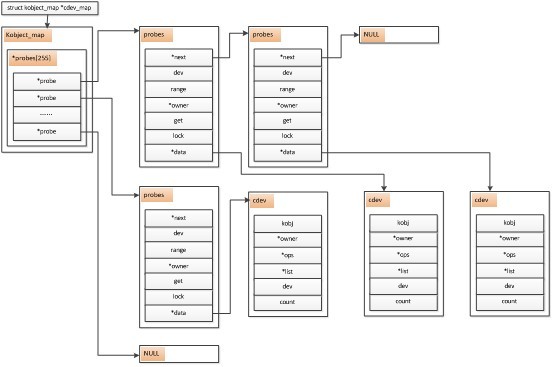驅(qū)動(dòng)之cdev
時(shí)間:2016-12-12作者:華清遠(yuǎn)見
前面寫到如何向系統(tǒng)申請(qǐng)一個(gè)設(shè)備號(hào),設(shè)備號(hào)就像我們的身份證號(hào)一樣,號(hào)本身并沒有什么特殊的意義,只有把這個(gè)號(hào)和人對(duì)應(yīng)才有意義,通用設(shè)備號(hào)也需要和一個(gè)特殊的東西對(duì)于,這就是cdev, cdev是linux下抽象出來(lái)的一個(gè)用來(lái)描述一個(gè)字符設(shè)備的結(jié)構(gòu)體,在linux下定義如下: struct cdev { 結(jié)構(gòu)體中有幾個(gè)成員事我們寫驅(qū)動(dòng)的時(shí)候必須關(guān)心的: dev 類型是dev_t,也就是我們的設(shè)備號(hào) ops是一個(gè)同樣也是一個(gè)結(jié)構(gòu)體并且是一個(gè)字符驅(qū)動(dòng)實(shí)現(xiàn)的主體,字符驅(qū)動(dòng)通常需要和應(yīng)用程序交互,在學(xué)linux系統(tǒng)編程的時(shí)候,都會(huì)講到linux 應(yīng)用程序通過(guò)系統(tǒng)調(diào)用陷入到內(nèi)核空間,從而執(zhí)行內(nèi)核代碼,而驅(qū)動(dòng)作為內(nèi)核的一部分同樣也是需要在內(nèi)核空間執(zhí)行的,ops也就是file_operations這個(gè)結(jié)構(gòu)體就是我們的驅(qū)動(dòng)為應(yīng)用程序調(diào)用驅(qū)動(dòng)而實(shí)現(xiàn)的一個(gè)操作的集合,它的定義如下: struct file_operations { 我們?cè)隍?qū)動(dòng)中要做的事情就是申請(qǐng)一個(gè)cdev并把cdev注冊(cè)到系統(tǒng)中去,操作cdev的函數(shù)有: void cdev_init(struct cdev *, const struct file_operations *); 1、cdev的定義 cdev的定義有兩種方式一種是:struct cdev cdev;另外一種是:strcut cdev cdev;cdev = cdev_alloc(); 2、cdev的初始化 cdev_init實(shí)現(xiàn)cdev的初始化,主要的工作是將我們定義好的file_operaionts與cdev關(guān)聯(lián)起來(lái),file_operations的實(shí)現(xiàn)根據(jù)實(shí)際需求來(lái)實(shí)現(xiàn),后面詳細(xì)介紹。 3、cdev的注冊(cè) cdev_add實(shí)現(xiàn)cdev的注冊(cè),linux內(nèi)核里維護(hù)了一個(gè)cdev_map的表,所謂cdev的注冊(cè)就是把我們的cdev注冊(cè)到cdev_map表上,cdev_map表結(jié)構(gòu)如圖:
4、設(shè)備的刪除 cdev_del 將我們的cdev從cdev_map中移除。 相關(guān)資訊
發(fā)表評(píng)論
|
 學(xué)院新動(dòng)態(tài)
學(xué)院新動(dòng)態(tài)
- 24歲女精英為星創(chuàng)客代言 誰(shuí)說(shuō)女子不
- 星創(chuàng)客老學(xué)員回訪:未來(lái)1-2年,挑戰(zhàn)
- 星創(chuàng)客硬實(shí)力的見證!年薪16W乃平常
- 夢(mèng)想啟航,星創(chuàng)客燃情歲月
- 濟(jì)南華清遠(yuǎn)見應(yīng)邀走進(jìn)棗莊學(xué)院
- 魅力華清 High翻山東財(cái)大
- 速來(lái)圍觀!上海中心老學(xué)員回校分享工
- 華清遠(yuǎn)見榮獲騰訊網(wǎng)回響“2016年
- 西京學(xué)院與華清簽約 為學(xué)員提供更好
- 畢業(yè)學(xué)長(zhǎng)親自傳授異地就業(yè)注意事項(xiàng)







